Farmer of the Month: Clair Kauffman of Kauffman Orchards
- By Lex Flamm
- Reading Time: 5 mins.
Kauffman Orchards in Bird-in-Hand, Pennsylvania, turns out super-sweet Saturn donut peaches, glossy Ruby Queen plums, and crisp Ginger Gold apples every year. But Orchard Manager Clair Kauffman is a pear man at heart.
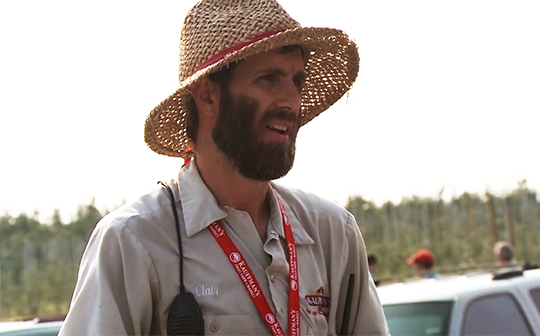
The Family Farm’s Best-Kept Secrets
“I really enjoy pears, and I think they’re a commonly misunderstood fruit, especially in the grocery store,” Clair told The FruitGuys in late July. “… They just haven’t been ripened properly. Often people try to eat them before they get that smooth, juicy, creamy texture. In our pear orchard, we have about 10 varieties of pears, and I think some of them are the best-kept secrets here.”
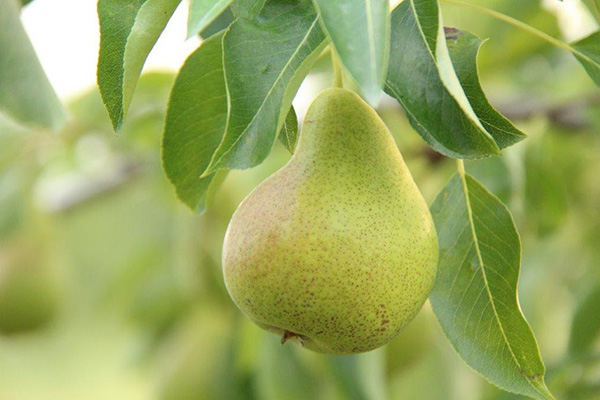
Pear season has already arrived at Kauffman Orchards, and some of Clair’s favorite varieties are on the horizon. Squat, sugary Seckel pears will appear around September 1, and Clair’s beloved Magness pears (a hard-to-find heirloom variety sweet enough for dessert) will ripen immediately after that. But when The FruitGuys called Clair in July, his family farm was swimming in summer peaches.
Stars Align for Pennsylvania Peaches
The Kauffman family has grown fruit on the same land in Bird-In-Hand since 1911, when Clair’s great-grandparents, Amos “A.L.” and Sue Kauffman, planted their first orchard. Today, Clair oversees about 80 acres of apples, peaches, pears, plums, cherries, berries, pawpaws, and—starting this fall—hazelnuts. The peach orchard is one of the largest on the family farm, filling 25 of its 80 acres with 30 varieties of peaches.
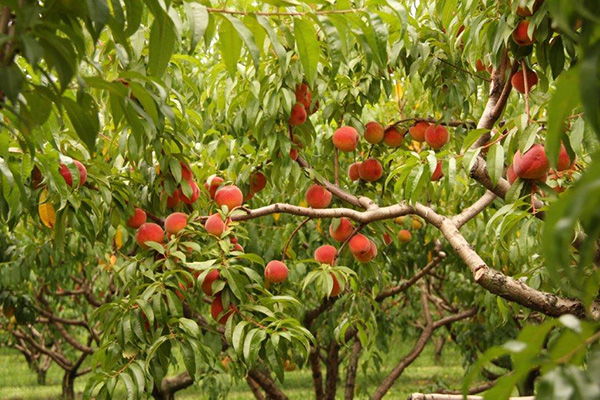
“This year I’ve been happy with just about every peach coming out of our orchard, because when it’s so dry we get much better flavor,” Clair said. “When you have a lot of rain it kind of dilutes the sugars and the flavors. The hot and dry weather enhances them.”
That strong harvest was a pleasant surprise. After the warm winter, Clair worried that spring cold spells would shock his early-blooming trees and keep them from setting fruit.
“We did have a few frosts, but our crops set nicely regardless, and I’m really happy for that,” he said.
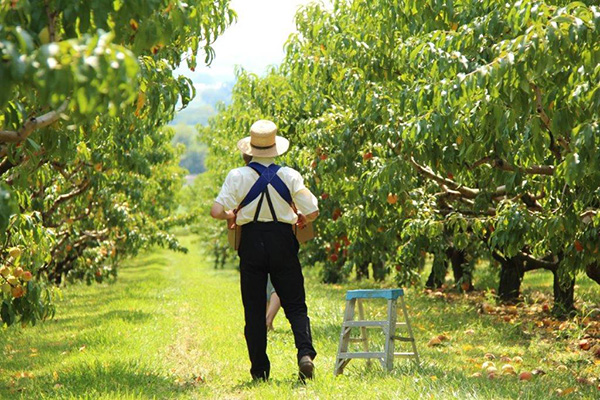
The peaches also survived an unexpected hail storm. The fruits were only about the size of golf balls when the bad weather hit, and the hailstones bounced right off “without lacerating the skin or making a dent.” According to Clair, springy, fuzzy young peaches can stand up to hail better than apples, which take more damage to their smooth, fine skin.
Saturn, John Boy II, Flamin’ Fury, and More
This year’s strong stone fruit harvest at Kauffman Orchards was good news for customers of The FruitGuys. In the spring, we added Clair’s cherries to our East Coast mixes, and so far this summer we’ve delivered several varieties of his white and yellow peaches—including the Saturn donut peach, a saucer-shaped, white-fleshed variety that’s perfect for snacking.
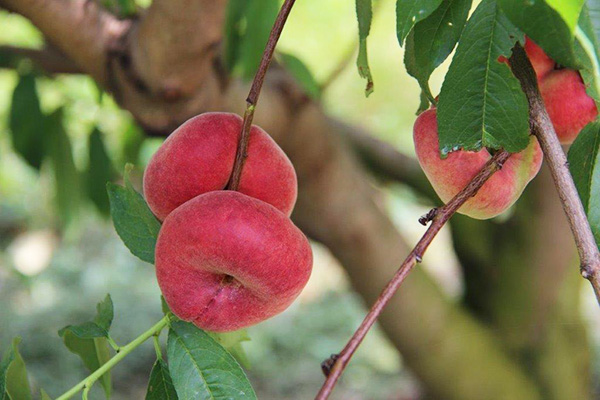
“It’s just a little bite-sized peach that you can easily eat without the juice running down your arm, even though it’s really juicy, because of its shape and the really small pit in the middle of the peach,” Clair said.
The Saturn donut ripens in July and heralds the arrival of other mid- and late-season peaches with creamy textures and complex flavors, including July stars like the Flamin’ Fury® and John Boy II® and August favorites like the Coral Star, Sunhigh, and Loring.
Want fruit for your office?
Get your office a free sample TODAY!Clair had no problem listing off these peaches and more from memory, including when they ripen and exactly how they taste. Perhaps that’s no surprise considering he grew up on the family farm, and his love of the land runs deep.
Preserving a Century-Old Family Farm
A.L. and Sue Kauffman’s original homestead still stands in the middle of Kauffman Orchards. Clair grew up there, then took over the house 20 years later when his father’s cousin moved out. Now, he and his wife are raising their four children in the same family home.
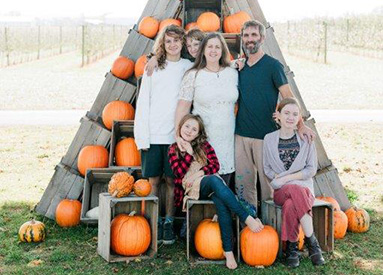
“I’ve worked full-time elsewhere for only about four years of my life,” he said. “… One of the things I love about being a farmer at this place basically all my life is that I feel pretty connected to this spot, this land. I feel like I have a good pulse on all of the living parts of this little ecosystem right here around our farm.”
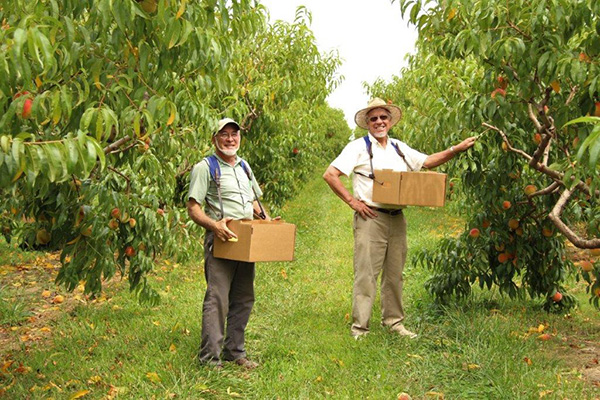
As the orchard manager, that’s basically Clair’s job. He oversees a team of 13-15 workers and runs nearly every aspect of the orchard, from pruning and tree training in winter, to planting in the spring and harvesting in the fall. He also keeps the farm relatively pest-free using eco-friendly integrated pest management (IPM) principles.
Managing Bugs, Voles, and More
“Our primary interest is in cultivating really healthy plants and soil because we find that the healthier the plant and the soil, the more they will naturally fend off disease and insect pressure. It’s interesting how many times we’ll notice that a sicker tree will get a disease or a tree that’s not thriving will be the first one to get the insect pressure when the insects come along,” Clair said.
Kauffman Orchards isn’t certified organic, but nearly all of the fertilizers it uses are. The team also practices proper pruning to maintain good airflow through the trees and takes steps to protect pollinators and other beneficial insects. They avoid spraying for bugs while their trees are blooming and provide year-round habitat for bees and butterflies with pollinator hedgerows and a half-acre wildflower meadow.
Even the farm’s rodent control has natural elements. Barn owls and kestrels help hunt down voles on the farm, and in 2010, The FruitGuys donated an owl box to Kauffman Orchards (then called Kauffman’s Fruit Farm) to help support their population.
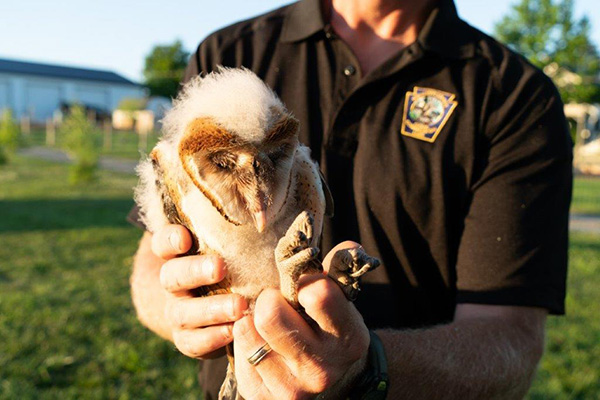
“We have a lot of voles that really like apple trees, and a family of barn owls with, say, five young ones like we had this year can eat 20 voles in one night,” Clair said.
By working with the land instead of against it, Clair and his family have managed to preserve their family farm for five generations. Hopefully, there will be many more years (and peaches) to come!


